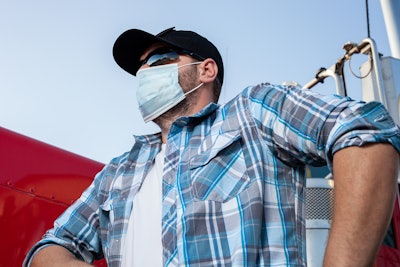 It isn’t clear whether a truck driver will be considered an essential worker, protected by a presumption that any COVID-19 infection occurred on the job. Such determinations could vary by state.
It isn’t clear whether a truck driver will be considered an essential worker, protected by a presumption that any COVID-19 infection occurred on the job. Such determinations could vary by state.Lawyers get asked questions. A lot of questions. Some are easy to answer. For example:
Q: Why are you short?
A: Crappy genetics.
Others aren’t so easy. In those cases, as any good lawyer will tell you, the answer begins with two words, as illustrated in my answer to a question I’ve been asked a lot recently:
Q: Is COVID-19 covered as a workplace injury?
A: It depends.
To truly answer that question, you need to know the law of every state. For starters, workers’ compensation laws vary by state. Coverage usually is mandated even if the business has only one employee, though a few states set a higher minimum number of employees, such as five for Alabama.
Most laws exempt independent contractors, so owner-operator truckers are on their own. That is, unless they lease to a fleet that requires workers’ comp or occupational-accident insurance. Or they simply choose independently to get such coverage.
 Brad Klepper is president of Interstate Trucker, a law firm dedicated to defending drivers. He is also president of the law firm Drivers Legal Plan. He can be reached at 800-333-3748, InterstateTrucker.com and DriversLegalPlan.com.
Brad Klepper is president of Interstate Trucker, a law firm dedicated to defending drivers. He is also president of the law firm Drivers Legal Plan. He can be reached at 800-333-3748, InterstateTrucker.com and DriversLegalPlan.com.Things are much hazier when it comes to workers’ comp coverage of COVID-19. Since the coronavirus outbreak, more than a dozen states have made some modifications to their workers’ comp laws, creating the presumption that front-line workers (nurses, doctors, etc.) contracted the virus on the job. These states include Illinois, Michigan and Utah.

This presumption has huge implications. It shifts the burden of proof from the claimant to the employer to produce any outcome other than what’s established by policy. In these states, the employer must prove that the claimant did not contract the virus at work.
There can be huge differences between states. Some have extended the presumption only to hospital or emergency room workers. Others have included all workers who are required to interact with the public. Would a truck driver fall in this category? I am not sure.
On the flip side, some states, like New York, have not changed their laws. Accordingly, to file a successful claim, the worker will need to show that they contracted the virus on the job. With a disease as contagious as COVID-19, that’s tough. How do you show you were infected while on the job, but not at the grocery store or from the handle of a gas station pump?
Even in states where the law has not been modified to create a presumption for certain workers, a few insurers are accepting claims. Of course, this likely will not last forever, as the long-term medical effects of COVID-19 and the costs of treating such claims are unknown.
Will long-term care require annual checkups? Booster vaccines? Insurers are reluctant to grant these claims, as they do not want to be on the hook for prolonged treatments.
So there is no clear answer about whether COVID-19 is covered under workers’ comp laws as a workplace injury. The virus is too new, the law too fluid and state provisions too diverse. I won’t be surprised if, by the time this appears in print, additional states will have proposed changes that either create a presumption in favor of the claimant or expressly deny such presumption in favor of the employer.
Just as our daily lives have been changed by the pandemic, so will how we deal with similar viruses in the future. Medical care has changed. Work environments have changed. How we interact with each other has changed.
And how, exactly, will laws change to address these developments and any future virus?
It depends.
Access all of Overdrive‘s Trucking Law installments via this link.









